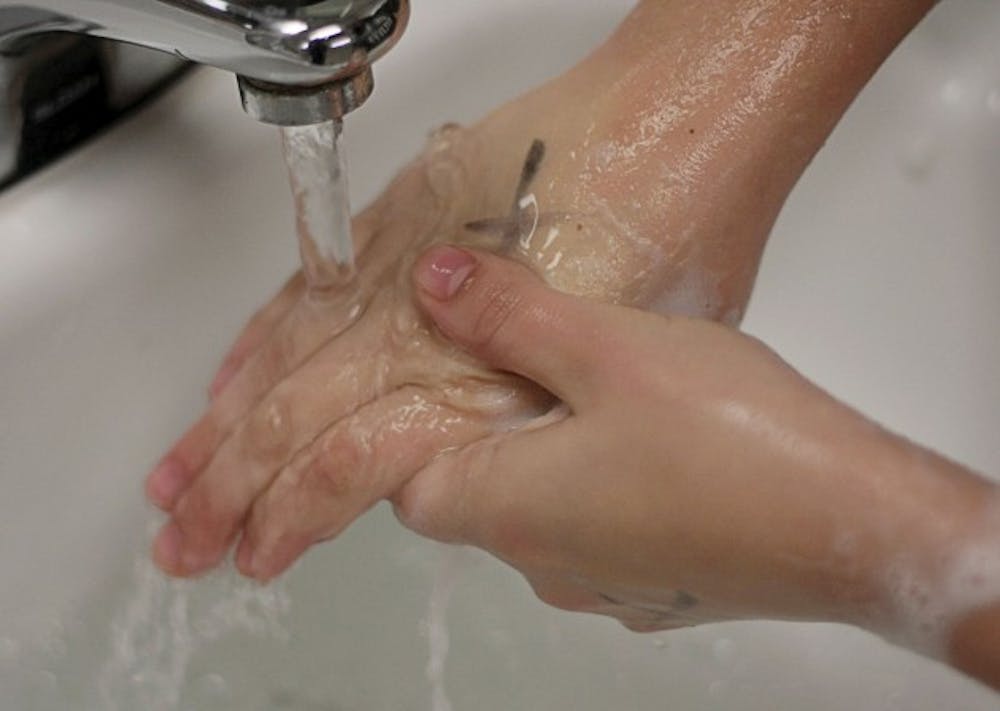College is the first time that many students are out of their parents' direct supervision. Parties, bars and alcohol usually serve as icebreakers for those meeting hundreds of new people.
However, drinking under the age of 21 is illegal under federal law and is thus not allowed anywhere on campus. Many times when students break the rules, University Police get involved.
Last year, according to the University Police Crime Statistics, there were 853 liquor law violations; 821 of these occurred on campus, inside residence halls.
The decision as to whether or not the UPD is called to the scene is largely under the Resident Advisor's discretion.
"I think there is zero tolerance [when it comes to] drinking," said Richard Linde, assistant chief of police. "We don't necessarily get called on every instance… but they are referred to Student Wide Judiciary or the Residence Hall [Association] if they get caught."
When students are referred to SWJ, they could face a number of punishments.
According to Marize Ayob, a university hearings representative for the SWJ, punishments may require a student to complete community service hours, write up to a five-page paper about what he or she learned from a specific incident, attend a four-hour educational program called UB Safer about what alcohol and substances do to your body, or, if the offense is severe enough, attend mandated counseling.
Some students don't think that such strict enforcement is necessarily the best measure.
"I do think it is a problem that students are forced to drink in cramped or secluded places where there is little supervision if anything goes wrong," said Chad Burlee, a senior political science major. "The harder authorities crack down, the harder students will find ways to drink, and it will not always be the safest way."
According to Linde, when police ask students how they obtained their alcohol, most say they used a fake ID or got it from a friend who is over the age of 21.
"I've had people get me alcohol before and have occasionally [gotten] it for others now that I'm 21," Burlee said. "What's the worst that can happen? [Liquor stores] just won't sell it to me. I highly doubt I'll get slapped with a ‘serving a minor' charge."
Other students feel differently about supplying alcohol to minors.
"I wouldn't buy [alcohol] for a minor because it's illegal," said Robert Royal, a senior communication major. "The longer [underage students] wait, statistically, the less likely they [are to] become alcoholics."
Even if a student doesn't have a friend of legal age, some believe that obtaining alcohol isn't a difficult feat.
"I think bars and liquor stores know about fake IDs and kind of turn a blind eye toward it so they can benefit from the sales that underage drinkers bring in," said Jordan Stewart, a senior communication major.
The stretch of Main Street right by South Campus hosts a number of bars that many college students feel are lenient in their admission of underage students.
One student, who wished to remain anonymous, claims she just has to push up her chest and smile at the bouncer in order to gain entrance to bars on Main Street.
A freshman exercise science major added that many bars allow 18 to 20 year olds in with a mark on their hands to indicate that they are underage. However, many patrons simply wash the mark off of their hands in the bar's bathroom.
Sometimes, however, getting into a bar isn't as simple as one may believe.
"I'd say, with a fake [ID], you probably have a 50/50 shot at getting in underage. I've never used one before, but I hear it just depends on the bouncer," Burlee said. "Sometimes they're really smart and can spot the smallest details that are incorrect."
If underage students are caught drinking off-campus, campus enforcement is more difficult.
"If we find out about it, we would refer them to SWJ," Linde said. "We obviously don't know of every instance unless they're involved in something [for which we'd typically] get notified."
More problems arise when intoxicated students decide to leave the parties or bars. Unfortunately, both non-students and students drive drunk on campus, which is a hazard to other students on the road.
"Year-to-date, there were 60 [DWIs]. I would say… a little less than a third were probably students. Otherwise, it was people who just wandered on campus," Linde said.
When students are arrested for DWI, they are typically sent to the Amherst Town Court and are reported to SWJ, according to Linde.
According to Michael Hilburger, chief hearings representative for the SWJ, punishments for on-campus DWIs are typically tailored to the individual incident rather than applied to a strict and unchanging established disciplinary system.
Underage drinking may not be solely an issue on the UB campus, but instead a widespread trend on campuses nationwide.
"I think that underage drinking has become really acceptable in our society," Stewart said. "It is viewed as just a part of life when you are in college, which in turn leads to more underage drinking. It's a vicious cycle."
Additional reporting by Annie Schneider.





